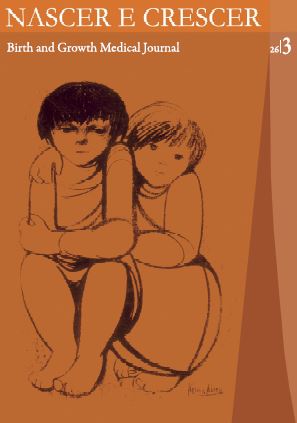What parents teach about sexuality to their children
DOI:
https://doi.org/10.25753/BirthGrowthMJ.v26.i3.9946Keywords:
Child, preschool age, sexual development, sexualityAbstract
Introduction: The child’s sexual development is a physiological process, influenced by children’s age, children’s experiences and for what is taught to them. So, those who actively participate in children education should be aware of the relevance of sexual education approach.
Objectives: Characterize sexual education of children aged six and seven years.
Methods: An observational, cross-section and community based study was performed and the targets were parents of children aged six and seven years. A self-administered questionnaire was applied addressing sociodemographic data and characterization of children sexual education. A score was built, by questions summation, with the aim of evaluating child knowledge about sexual education, and parental involvement in this education, which was higher, as higher the score obtained. All statistical analyses were performed using the Statistical Package for the Social Sciences® (SPSS), 22.0. software package for Windows.
Results: We obtained questionnaires from 127 parents, with a mean age of 38 years and mothers’ predominance. Twenty-two percent of parents sought knowledge about their child sexuality, and one third obtained doctor’s information. Although 91,2% referred to feel comfortable to approach sexuality with their children, 62,9% never did it, mainly because they considered to be too early. When sexual education was performed at home, the questions were raised mostly by children’s initiative. Human reproduction and gender differences were addressed exclusively at home in 55,8% and 35,5%, respectively. Parents initiative to approach adequate body behaviour in public/private domains and body inappropriate behaviour by others were made in 88,5% and 97% of cases, respectively. The average of score of parents’ sex education performance was 13,7 and there were differences between mothers (14,5±5,3) and fathers (12,6±4,9) assessment (p <0.05).
Conclusions: The results show that parents do not prioritize this aspect of child development, which is reiterate by infrequent approach of issues related to sexual education by parents’ initiative.
Downloads
References
MFriedrich WN, Fisher J, Broughton D, Houston M, Shafran CR. Normative Sexual Behavior in Children: A Contemporary Sample. Pediatrics 1998; 101:e9.
Friedrich WN, Grambsch P, Broughton D, Kuiper J, Beilke R. Normative Sexual Behavior in Children. Pediatrics. 1991; 88:456.
American Academy of Pediatrics: Committee on Psychosocial Aspects of Child and Family Health and Committee on Adolescence. Sexuality education for children and adolescents. Pediatrics. 2001; 108:498-502.
Clinical Report−The Evaluation of Sexual Behaviors in Children Nancy D. Kellogg Pediatrics 2009; 124:992. doi:10.1542/peds.2009-1692.
Hagan JF, Shaw JS, Duncan P. Bright futures: Guidelines for health supervision of infants, children, and adolescents. 3rd ed. Elk Grove Village, IL: American Academy of Pediatrics; 2008. p. 169-76.
Pike LB. Sexuality and Your Child for children ages 3 to 7, Department of Human Development and Family Studies, University of Missouri-Columbia. 1995.
National Guidelines Task Force. Guidelines for comprehensive sexuality education: Kindergarten-12th grade, 3rd edition. New York, NY: Sexuality Information and Education Council of the United States. 2004. (Acedido em 1 de abril de 2014). Disponível em: http://www.siecus.org/_data/global/images/guidelines.pdf.
Hoskins A, Varney J. Taking a life-course approach to sexual and reproductive health. Entre Nous 2015; 82:4-7.
Public Health Agency of Canada. Canadian Guidelines for Sexual Health Education. 2008. Disponível em: http://www.phac-aspc.gc.ca/publicat/cgshe- ldnemss/pdf/guidelineseng.p
Downloads
Additional Files
Published
How to Cite
Issue
Section
License
Copyright and Authors' Rights
All articles published in Nascer e Crescer - Birth and Growth Medical Journal are Open Access and comply with the requirements of funding agencies or academic institutions. For use by third parties, Nascer e Crescer - Birth and Growth Medical Journal adheres to the terms of the Creative Commons License "Attribution - Non-Commercial Use (CC-BY-NC)".
It is the author's responsibility to obtain permission to reproduce figures, tables, etc. from other publications.
Authors must submit a Conflict of Interest statement and an Authorship Form with the submission of the article. An e-mail will be sent to the corresponding author confirming receipt of the manuscript.
Authors are permitted to make their articles available in repositories at their home institutions, provided that they always indicate where the articles were published and adhere to the terms of the Creative Commons license.


